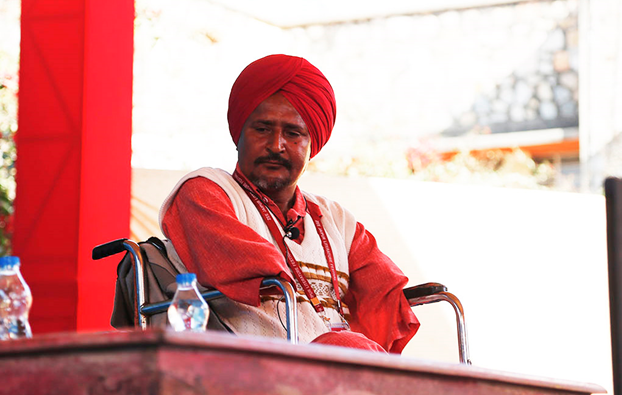THE EXTRAORDINARY BALLAD SINGER OF PUNJAB

The Ballad of Bant Singh has started reverberating across Punjab, and perhaps soon across the country, as he gives a voice to those who are not forgotten and ignored by governments.
Known as the “singing torso” this Mazhabi Sikh lost his limbs in his fight to get justice for his eldest daughter who was gang raped by the upper caste Jats in Jhabbar village of Mansa in Punjab in 2000. He happened to be the first Dalit to report the heinous crime and attain justice for his daughter. Despite the pressure from the panchayat not to raise his voice against, Bant followed the case and made sure that the accused went behind bars.
He was offered Rs 10 lakhs, gold ornaments and a scooter to keep quiet. The village panchayat told his family that nobody would marry his daughter. The common practice in the village was to ignore such crimes on the Dalits. But the brave Bant and his daughter refused to relent.
His fight came at a heavy price when he was assaulted by the upper caste men allegedly related to the accused on January 5, 2006 while he was on his way back from the fields. He was assaulted with iron rods and axes and was left to die.
He was rushed to Mansa hospital but where inhumanity and biases against the downtrodden were waiting. The doctor on duty refused to treat him till he was given a bribe of Rs 1000. Bant was left unattended for 36 hours. After that the hospital authorities swung into action only to inform the family that they did not have adequate facilities to treat him. He was rushed to the PGI in Chandigarh but by then the gangrene had spread and his two arms and one leg had to be amputated.
This attack was to silence him and his daughter. But just after his amputation Bant said, “You can cut my arms and legs but you cannot cut my tongue.” Since then Bant has sung, mainly songs by Sant Ram Udasi, about the joys and sorrows of the working class, the plight and resolve of the poor.
Bant is an epitome of the struggle for justice for the downtrodden, the dalits and those who are compelled to live on the margins of the society.
“Initially no media reported it the matter which highlights how insensitive the fourth estate has become. It was only after a press conference at Chandigarh that the matter was taken up. As the wrong always follows the right, the Jats used their influence approach media houses with distorted versions like the attack on Bant was because of personal rivalry etc,” said Davi Kaur who has written on Bant. She is also translating the book penned by noted writer Nirupama Dutt “The Ballad of Bant Singh” in Punjabi. The book was released in Chandigarh on Sunday.
Davi told The Citizen,”Even I received calls after my story was published. But I told them that they stood on the wrong side.”
Bant stands tall in Punjab, thanks to the support and care given by his family, particularly his wife Harbans Kaur, a quiet lady with resolve written clearly on her face. Their daughter who was assaulted is a married woman today.
The glow on his face and an assuring smile makes his songs a treat to be heard. Bant has been fighting several small battles against injustice at all levels, be it irregularities in public distribution system or the oppression of dalits.
“I was born in a family of bonded labourers. Since my childhood I wanted to take the flight of freedom,” he said.
For Nirupama, the experience of penning Bant's journey has been a rewarding experience. “He has changed my perception of Punjab and its life. Whenever I am depressed, I just think of him and his zeal for life,” she said.
Bant can be heard at programmes singing about the fight for equality, dignity and freedom. His songs talk about ensuring livelihood for all, gender equality, a society that is happy. His ballad continues to enthrall all.



